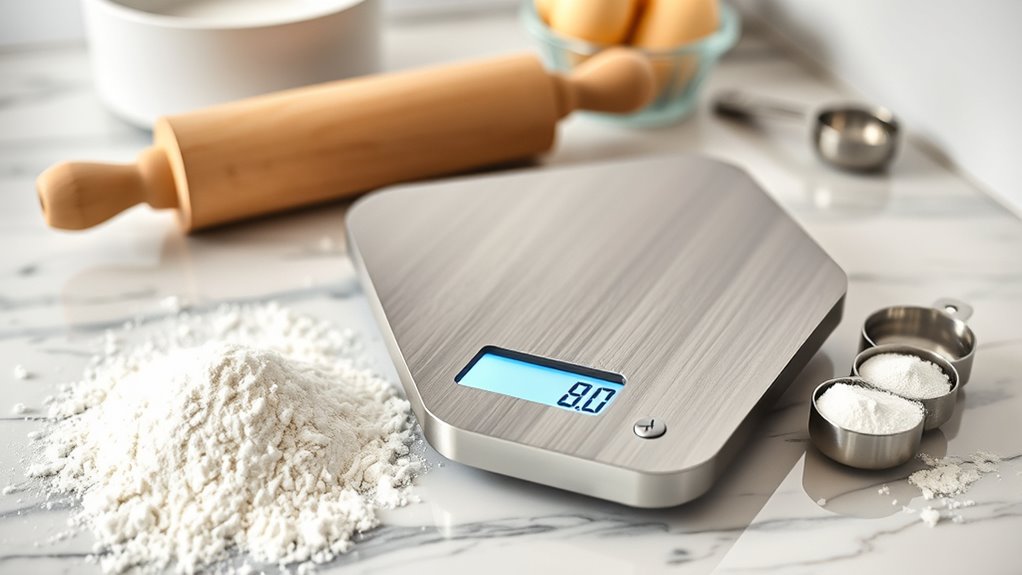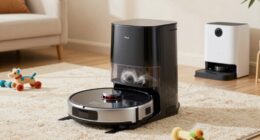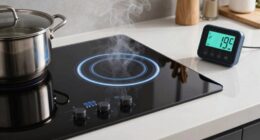Precision scales work by detecting force with a load cell and converting it into electrical signals, often using strain gauge technology. They come in mechanical and digital types—mechanical use springs and dials, while digital models provide fast, highly accurate measurements. Proper use involves taring, placing ingredients carefully, and regular calibration. Understanding these features guarantees your baked goods turn out perfect. Keep exploring to discover how to choose and maintain the best scale for your needs.
Key Takeaways
- Precision scales measure ingredients accurately, often to 0.1 grams, ensuring consistent baking results.
- Load cells and strain gauge technology convert force into electrical signals for precise weight readings.
- Proper calibration and tare functions help maintain accuracy during ingredient measurement.
- Digital scales provide faster, more precise measurements and multiple unit options, ideal for baking.
- Using a scale with adequate capacity and fine resolution prevents errors and improves baking consistency.
Understanding How Precision Scales Work

Although they may seem simple, precision scales use advanced technology to measure weight with remarkable accuracy. Inside, a load cell detects the force exerted by the item on the scale. When you place something on the platform, the load cell converts this force into an electrical signal. This signal is then processed by a digital system that interprets it into a precise weight reading. Most precision scales use strain gauge technology, which involves tiny resistors that change resistance when stretched or compressed. This change is proportional to the weight applied. The scale’s circuitry amplifies and filters these signals to eliminate noise, ensuring an accurate measurement. The result is a reliable, digital display showing your item’s exact weight, often to the nearest tenth or hundredth of a gram.
The Different Types of Baking Scales
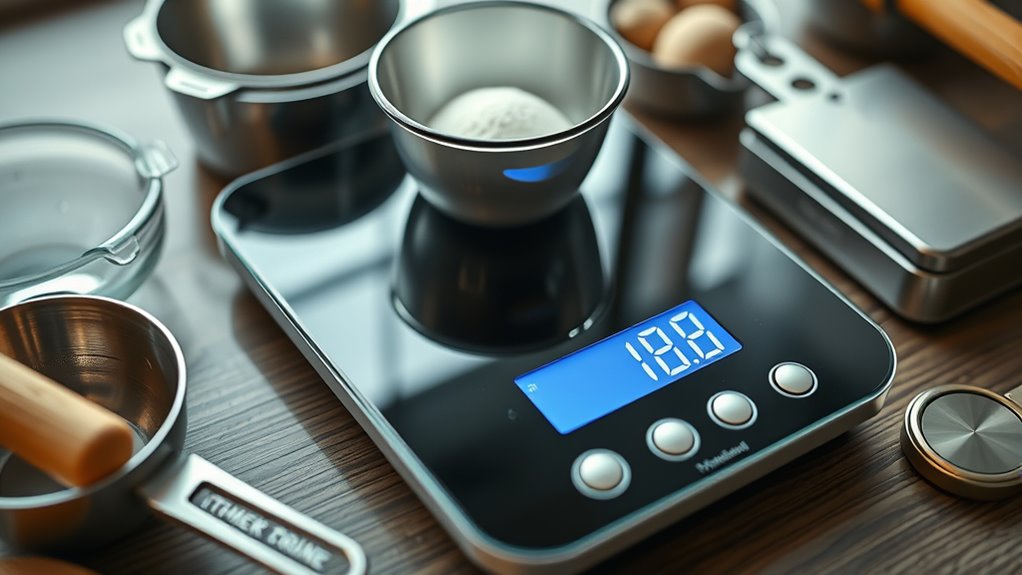
When choosing a baking scale, you’ll notice options like mechanical and digital models, each with its own advantages. Consider the precision and capacity you need to guarantee accurate measurements for your recipes. Understanding these differences helps you pick the right scale for your baking needs. For tasks requiring detailed finish quality, selecting a model with high accuracy and consistent performance is essential. Additionally, features like ease of use and durability can influence your overall satisfaction with the scale. To ensure optimal results, selecting a scale that aligns with your specialized baking requirements can make a significant difference in your baking outcomes. For example, sound healing science demonstrates how specific frequencies can influence physical health, similar to how choosing the right scale can enhance your baking precision.
Mechanical vs. Digital
Choosing between mechanical and digital baking scales depends on your preferences and needs. Mechanical scales use a dial and a spring mechanism, offering a classic, straightforward design. They don’t require batteries, making them reliable and easy to use in any setting. Digital scales, on the other hand, provide precise measurements with the push of a button and often feature tare functions, allowing you to zero out the weight for multiple ingredients. They are typically faster and easier to read, especially for small measurements. However, digital scales depend on batteries and can be more fragile. Mechanical scales tend to be more durable and low-maintenance, while digital scales offer convenience and greater accuracy for precise baking. Additionally, understanding pinball machine weight can be useful if you plan to move or set up your equipment, ensuring safety and proper handling. Being aware of calibration importance can help maintain the accuracy of your scale over time, which is crucial for successful baking. Proper scale maintenance can extend the lifespan and performance of your device, ensuring consistent results. For those interested in performance upgrades, selecting the right scale can help ensure accurate measurements crucial for successful baking.
Precision and Capacity
Understanding the accuracy and capacity of your baking scale helps you select the right tool for your needs. Precision determines how fine the measurements are, vital for delicate recipes. Capacity indicates the maximum weight it can handle, essential for larger batches. For example, a scale with 0.1g precision is perfect for baking small amounts, while a capacity of 11 lbs suits bulk ingredients. Here’s a quick comparison:
| Type of Scale | Precision | Capacity |
|---|---|---|
| Pocket Scale | 0.01-0.1g | Up to 200g |
| Kitchen Scale | 1-2g | 11 lbs or more |
| Postal Scale | 1-5g | Up to 10 lbs |
| Commercial Scale | 5-10g | Several hundred lbs |
Choosing the right balance of precision and capacity guarantees accurate results without frustration. Understanding scale accuracy helps you select the most suitable device for your specific baking needs. Additionally, considering calibration ensures your scale maintains its precision over time. Proper calibration is crucial for maintaining measurement reliability and achieving consistent baking outcomes. Maintaining measurement accuracy is also important for adhering to recipes precisely and ensuring your baked goods turn out perfectly every time. Regularly verifying your scale’s calibration can prevent measurement errors and improve baking precision.
Why Accurate Measurements Matter in Baking
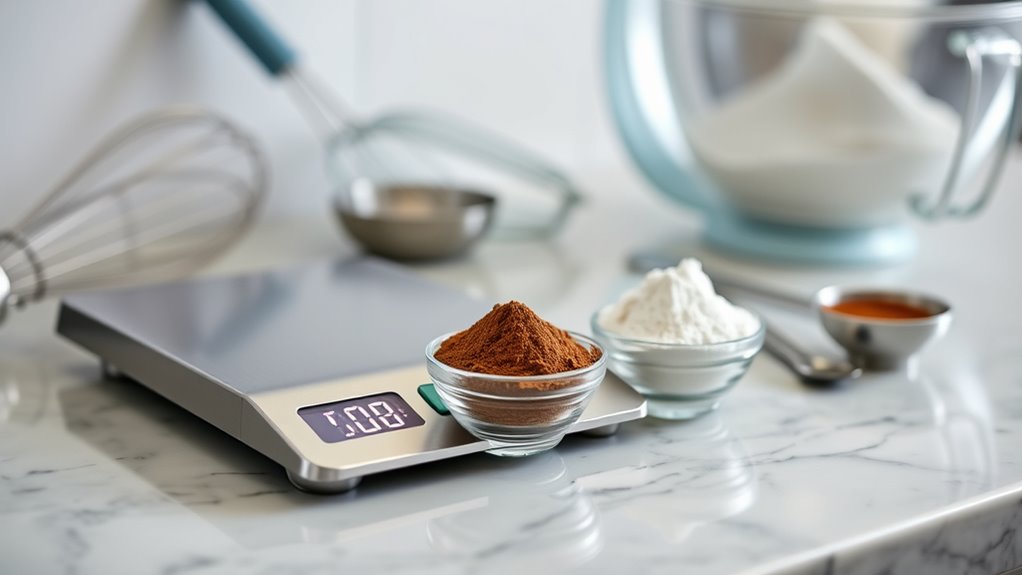
When you use an accurate scale, you get consistent results every time you bake. Proper measurements guarantee the right balance of ingredients, which enhances flavor and texture. Precision makes your baking more reliable and delicious. Paying attention to measurement accuracy can also help prevent mistakes that might require starting over. Additionally, understanding trust issues related to measurements can help build confidence in your baking process. Recognizing the importance of ingredient freshness can further ensure your baked goods turn out as intended. Furthermore, calibration techniques for scales are essential to maintain consistent precision over time.
Consistent Results Every Time
Have you ever wondered why your baked goods turn out differently each time, even when you follow the same recipe? The key is measurement accuracy. When you use a precision scale, you guarantee each ingredient is exact, reducing variability. Small differences in ingredient amounts can profoundly affect texture, rise, and flavor. Consistent measurements mean your recipes turn out reliably every time, eliminating guesswork. This consistency helps you perfect your baking skills and achieve the results you want. It also saves you time and ingredients, preventing wasted batches. By investing in a good scale, you create a dependable foundation for your baking process. Ultimately, precise measurements lead to predictable, professional-quality baked goods that match your expectations, making every baking experience satisfying and successful.
Ingredient Balance and Flavor
Ever wondered how a small change in ingredient measurement can alter the flavor of your baked goods? Precise measurements ensure the right balance of ingredients, which directly impacts taste and texture. When you measure accurately, you:
- Enhance the natural flavors without overpowering them
- Achieve consistent sweetness and richness
- Prevent overly salty, bland, or bitter results
- Maintain the intended aroma and mouthfeel
Using a precision scale helps you fine-tune ingredient ratios, giving your baked items the perfect harmony. Even slight deviations can lead to flat, overly dense, or overly dry outcomes. By prioritizing accuracy, you control flavor profiles, making your baked goods reliably delicious every time. In baking, precision isn’t just about measurement—it’s about ensuring every bite hits the right note.
Features to Look for in a Baking Scale
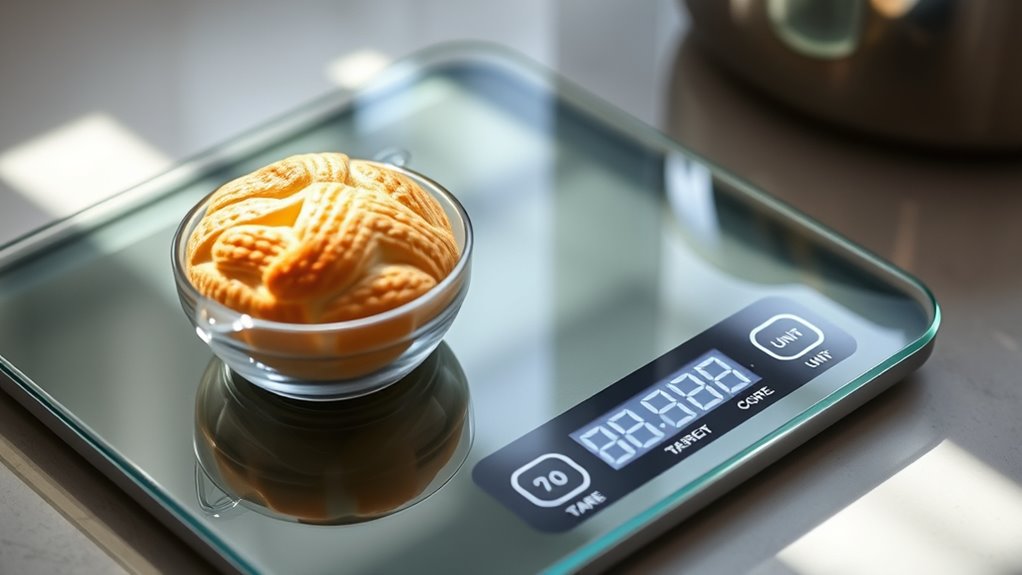
Choosing a baking scale that meets your needs involves paying attention to several key features. First, look for a scale with a high precision, ideally measuring in grams or ounces with at least 0.1-gram accuracy, so your recipes turn out perfect. An easy-to-read digital display is essential for quick, accurate measurements. Consider a scale with a tare function, which allows you to subtract the weight of bowls or containers, simplifying your process. Battery life and power options matter too—choose one with long-lasting batteries or a USB recharge. Compact size and portability make storage easier, especially if you have limited space. In conclusion, durability and ease of cleaning ensure your scale stays reliable and hygienic through repeated use. These features help you achieve consistent, baking-perfect results.
Tips for Using Precision Scales Effectively
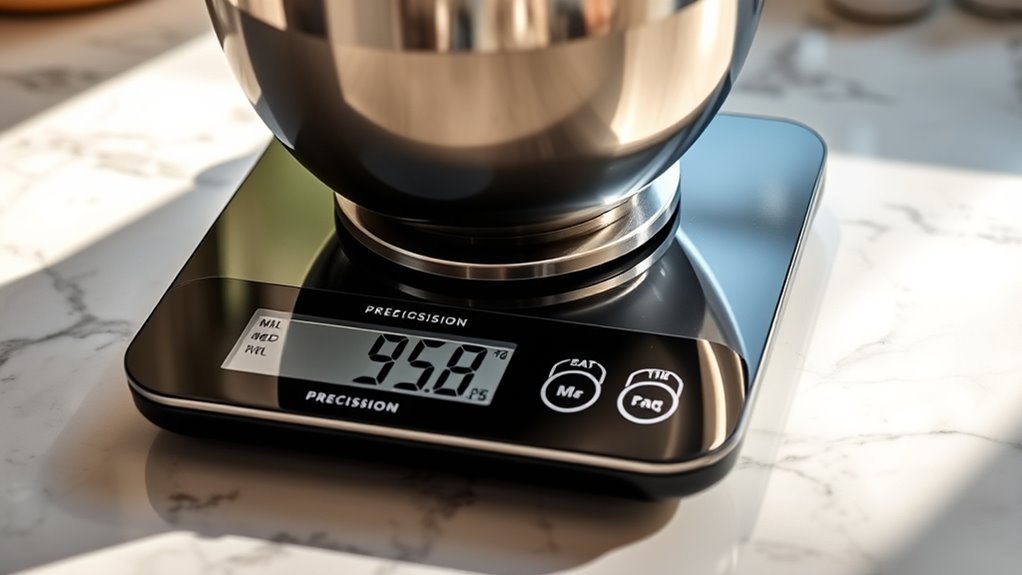
Using your precision scale correctly can make a noticeable difference in your baking results. To get the most accurate measurements, always tare the scale before adding ingredients. Use a flat, stable surface to guarantee stability and avoid errors. When measuring, add ingredients slowly to prevent overshooting your target weight. For best results, measure directly in your mixing bowl or container to minimize transfer errors. Keep your scale clean and free of residue that could affect accuracy. Avoid moving the scale while measuring, as this can lead to inconsistent readings. Regularly calibrate your scale if possible to maintain precision. Finally, record measurements carefully, especially for delicate recipes, to ensure consistent outcomes. Following these tips helps you maximize your scale’s potential and improves your baking precision.
Common Mistakes When Measuring Ingredients

One common mistake when measuring ingredients is neglecting to level off dry ingredients like flour or powdered sugar. If you scoop too much or don’t remove the excess, your measurements will be inaccurate, affecting your recipe’s outcome. Avoid using the back of a knife or a finger to level; instead, gently sweep across the top with a straight edge like a butter knife. Another mistake is measuring ingredients directly from the container without weighing them first, which can lead to inconsistent results. Also, don’t forget to tare your scale after placing your container; otherwise, you’ll record the weight of the container rather than your ingredient. These errors can throw off your measurements and compromise your baking precision. Always double-check your measurements before proceeding.
Comparing Digital and Mechanical Scales
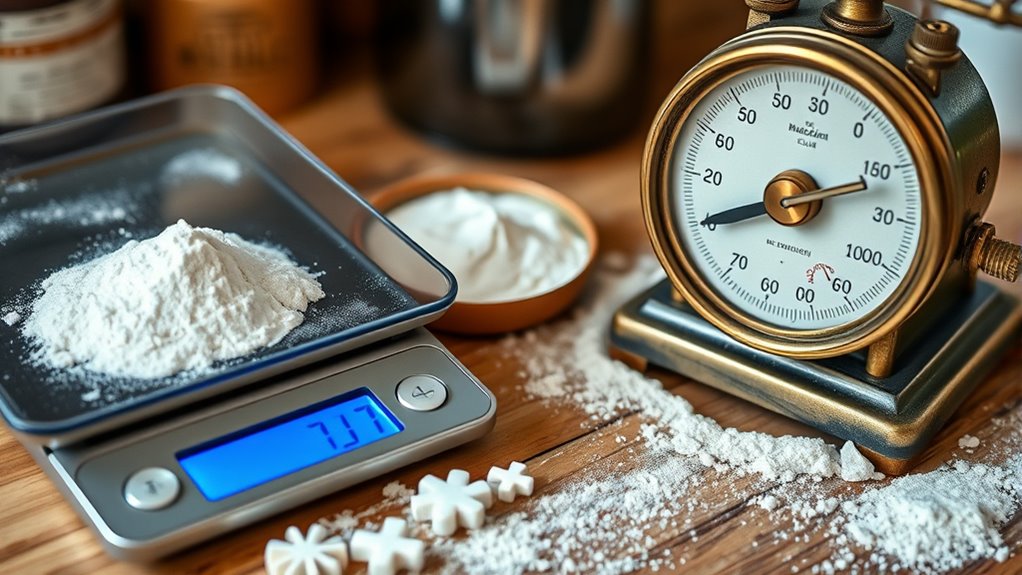
Have you ever wondered whether a digital or mechanical scale is better for your kitchen? Both have advantages and drawbacks, so your choice depends on your needs. Digital scales are known for their accuracy, quick readings, and easy-to-read displays, making them ideal for precise baking. They often feature tare functions and multiple units, adding convenience. Mechanical scales, on the other hand, are simple, durable, and don’t rely on batteries, which means less maintenance. They’re usually less expensive and easier to calibrate. Consider these points:
Digital scales provide quick, accurate readings perfect for precise baking, while mechanical scales are durable, simple, and cost-effective.
- Digital scales offer precision and speed
- Mechanical scales are reliable and low-tech
- Digital displays are easier to read
- Mechanical scales are more durable and cost-effective
Choose based on your baking frequency, preference for tech, and budget.
Maintaining and Calibrating Your Scale
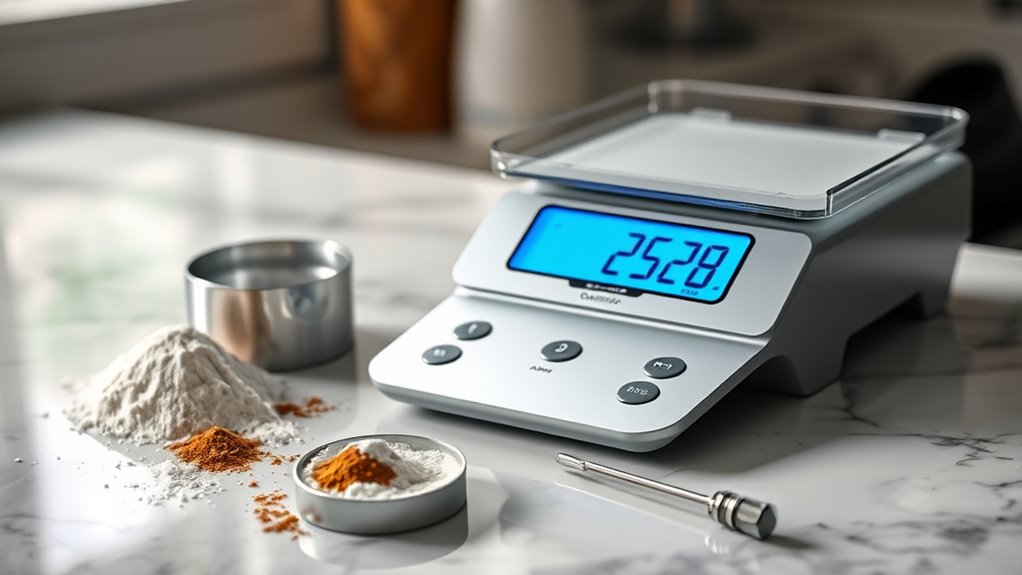
To keep your scale accurate and reliable, regular maintenance and calibration are necessary. Start by cleaning your scale with a soft, damp cloth to remove dust and residue, which can affect measurements. Avoid harsh chemicals that might damage the sensor. Check for any visible damage or loose parts periodically. Calibration ensures your scale provides precise readings; many scales have a calibration feature or require calibration weights. Follow the manufacturer’s instructions carefully, and calibrate your scale whenever it’s moved or after extended periods of non-use. Store your scale on a flat, stable surface to prevent inaccuracies caused by tilting. Regular maintenance and calibration help maintain the scale’s accuracy, ensuring your baking measurements stay precise every time.
Frequently Asked Questions
How Often Should I Calibrate My Precision Scale?
You should calibrate your precision scale regularly to guarantee accurate measurements. For baking, it’s best to calibrate at least once a month or whenever you notice discrepancies in your results. If you move the scale or after heavy use, recalibrate to maintain accuracy. Keeping a calibration schedule helps you trust your measurements, leading to better baking outcomes. Always follow the manufacturer’s instructions for calibration to get the best results.
Can Precision Scales Measure Liquids Accurately?
Think of your precision scale as a faithful navigator guiding your baking journey. Yes, it can measure liquids accurately if it’s designed for that purpose and you use a proper container. Always confirm the scale is calibrated, and tare it correctly with your liquid container. Keep in mind, some scales are better suited for dry ingredients, so check your model’s specifications to ensure liquid measurements stay on point.
What Is the Maximum Weight Capacity of Most Baking Scales?
Most baking scales have a maximum weight capacity that ranges between 5 to 11 pounds (2.3 to 5 kilograms). You should choose a scale that comfortably surpasses your typical baking needs to ensure accuracy and avoid overloading. If you often work with larger quantities or heavier ingredients, opt for a scale with a higher capacity, like 11 pounds, to prevent any issues during measuring.
Are There Any Safety Concerns With Electronic Scales?
Think of electronic scales as your trusty safety net in the kitchen. While they help you measure with precision, they can pose risks if mishandled. For example, water spills or exposure to extreme heat may cause electrical shorts, and overloading can damage the device. Always keep your scales dry, avoid overloads, and unplug them when not in use to guarantee safe, reliable baking adventures.
How Do Environmental Factors Affect Measurement Accuracy?
Environmental factors like temperature, humidity, and air currents can impact your measurement accuracy. When you use a precision scale, fluctuations in temperature can cause the device to expand or contract, leading to incorrect readings. Humidity adds moisture, which might affect sensitive measurements. Air currents can cause unstable readings, especially with highly sensitive scales. To get the most accurate results, place your scale in a stable environment away from drafts and moisture.
Conclusion
By understanding how precision scales work, choosing the right type, and practicing proper use, you guarantee every baking project is successful. Prioritize accuracy, maintain your scale regularly, and avoid common mistakes to achieve perfect results. Remember, accurate measurements matter, calibration matters, and consistency matters. With the right scale and the right attitude, you’ll elevate your baking, improve your skills, and enjoy delicious, reliable outcomes every time.
